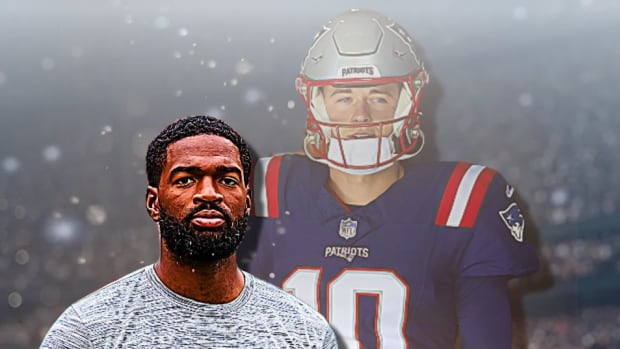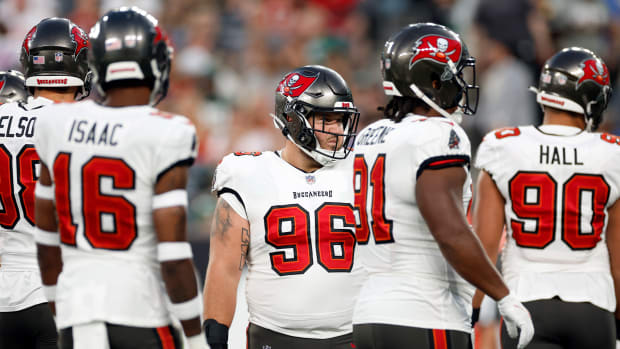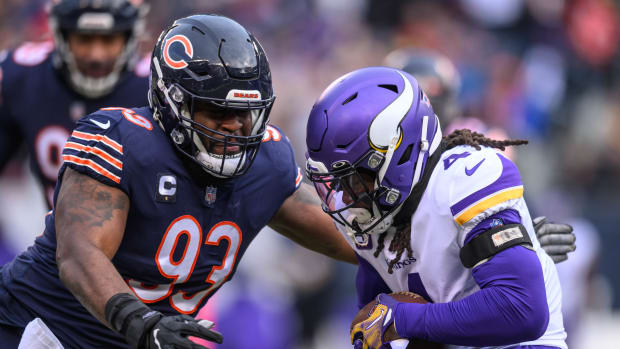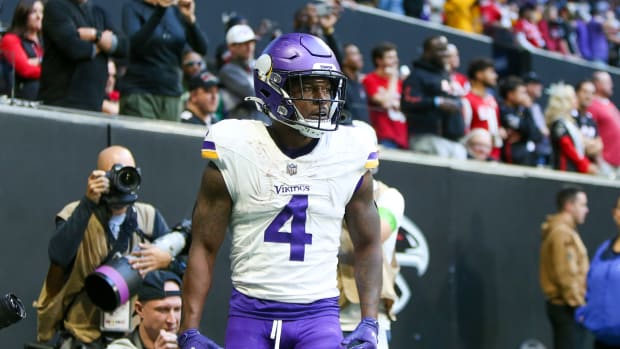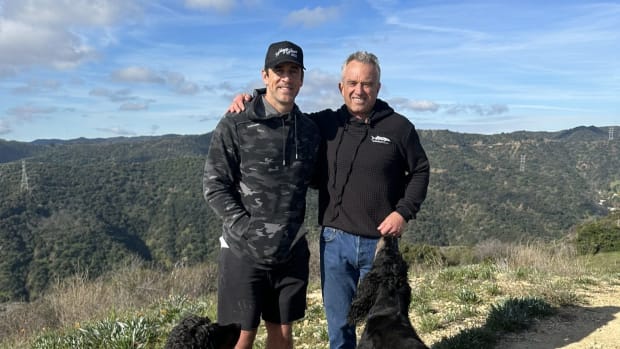The shrinking commish: Are Goodell's days as disciplinarian numbered?
This story appears in the September 14, 2015 issue of SPORTS ILLUSTRATED. To subscribe, click here.
Who does that big monkey think he is? It seems I'll have to show somebody who's running this game.—Baseball commissioner Kenesaw Mountain Landis on Babe Ruth, Oct. 15, 1921
Aw, tell the old guy to go jump in a lake. —Babe Ruth, Oct. 15, 1921
So here’s how that one went:
Landis, the white-haired, Biblically-visaged judge who banned eight “Black Sox” players for throwing the 1919 World Series, demanded that the Yankees’ slugger desist from participating in a barnstorming tour. Ruth, the game’s biggest star coming off his greatest year, boasted that the commissioner couldn’t stop him. Landis fined and suspended Ruth for the first six weeks of the ’22 season. Fans were outraged. But the old man stood firm, and the big monkey sat.
Before we move on to the forever war between NFL commissioner Roger Goodell and Patriots star quarterback Tom Brady, it’s important to note the difference a century makes. Calling anyone a monkey, of course, would never fly today. And a lake would hardly be big enough to accommodate the commissioner of today’s American pastime, what with all the volume required for the attendant corporate, legal and p.r. superstructure buttressing the NFL, not to mention its gleaming new Park Avenue headquarters and the stupendous annual revenue—$12 billion and rising—that envelops and insulates Goodell like a fortress of gold.
The average value of an NFL team has increased by 65% during Goodell’s nine-year tenure, to nearly $1.5 billion. This is the prime number to factor anytime you hear that his stunningly ham-fisted attempts to channel Judge Landis have jeopardized his job. Even after U.S. District Court judge Richard Berman dealt Goodell another humiliating defeat by vacating Brady’s four-game suspension for his role in Deflategate last week, even amid the crowing coming out of New England and the NFL Players Association, few—if any—colleagues or observers with NFL knowledge consider Goodell’s job in trouble.
Suspicions of Bill Belichick's Patriots regime persist among opponents
“I’ve certainly never had that thought in my mind, that any of these were survival issues for Roger,” said Steelers president and co-owner Art Rooney II in late August. “And I have not gotten that sense from other owners. We have disagreements, but none of this has amounted to something that is a question of Roger’s survival as our commissioner.”
Contacted through a team spokesman after Berman’s ruling last week, Rooney declined to amend his statement. “Roger’s job is safe,” says ex–NFL QB Charlie Batch, a former member of the NFLPA executive committee. “I don’t think this puts into question anything, on the owners’ side, to make them want to change. His goal was to be a $25 billion a year industry by 2025, and he’s on his way. If he hits the benchmarks he promised, he’s going to be safe. I don’t think there’s any reason now to question whether he’s able to hit those numbers.”
• MMQB: Goodell should drop appeal, close the book on Deflategate
That doesn’t mean, however, that Goodell has not been weakened by an annus miserabilis that began last fall when courts and arbitrators began to carve back his sentences: Ravens running back Ray Rice’s indefinite suspension for domestic violence was overturned in November, Vikings running back Adrian Peterson’s suspension for child abuse was overturned in February, Cowboys defensive end Greg Hardy’s domestic abuse suspension was slashed from 10 games to four in July. All that—plus Goodell predecessor Paul Tagliabue’s rebuke of the multigame suspension of four Saints players in 2012 for engaging in a bounty scheme—has thoroughly undermined Goodell’s self-proclaimed mission to enforce a hard line on personal conduct and competitive integrity.
Call it the Goodell Paradox. Whenever the 56-year-old son of a U.S. senator has tried to project power, to dispense what Berman stingingly termed “his own brand of industrial justice,” he has succeeded only in eroding his moral authority. His most severe punishments feel arbitrary or disproportionate—a result, says one former league executive who worked with Goodell on several major projects, of “shooting from the hip and making it up as he goes along and trying to be too tough.” Goodell has skillfully cultivated his most vital voting bloc—the 32 NFL owners—but unlike effective communicators such as former baseball commissioner A. Bartlett Giamatti and the NBA’s David Stern, he has been abysmal at selling his reasoning to the public. Working often under the advice of pollster Frank Luntz, Goodell was AWOL for Q and A’s after his ruling on the Patriots for Spygate in 2007, issued vague platitudes in his press conference on Rice, and declined comment for this story.
But Exhibit A, of course, is now Deflategate. Though Goodell clearly believes that Brady and the Patriots cheated—and Berman’s ruling did nothing to dispute that (the Pats still lose two draft choices and must pay a $1 million fine)—neither the league-commissioned Wells Report nor bland explanations by Goodell and his staff convincingly showed how, exactly, the reigning Super Bowl MVP could or did gain an unfair edge with a “general awareness” of a minuscule deflation of balls during last season’s 45–7 AFC championship game victory over the Colts.
Punch seen 'round the world: How NFL has changed since Ray Rice video
“I don’t think Roger gets out there enough and explains what he’s doing,” says Fay Vincent, baseball’s commissioner from 1989 to ’92. “I don’t think he stands up and takes the heat. But it’s innate: You like it or you don’t. If you stay inside and don’t take the questions and explain your position, you have a growing political problem. Roger Goodell has a growing political problem, but it’s under his control. He’s got to get people to understand what he’s doing and why, to believe in his goodwill and accept that moral authority. He’s got to come across as the ultimate protector of football.”
Those who have seen Goodell in action say he’s a talented negotiator and tireless worker with a fierce temper, but he has no legal training and he surrounds himself with loyalists. An economics major at Washington & Jefferson College, the league lifer started as an intern with the NFL in 1982. No one doubts his devotion to the game’s integrity, but the pattern of reversible rulings suggests either a staff that’s reluctant to question him or sloppy vetting by advisers like executive vice president and general counsel Jeff Pash and outside counsel Gregg Levy. Adolpho Birch, the NFL’s VP in charge of labor policy, was a public disaster when he tried to defend the original Ray Rice decision last fall, but the quiet departure last week of VP of communications Paul Hicks may well be the lone—and, if so, paltry—admission that the NFL’s procedure for meting out and explaining disciplinary acts has tripped into incoherence.
“It is all about politics and understanding your constituency and how to govern and knowing your own limitations,” says Frank Hawkins, the NFL’s vice president, business affairs, from 1993 to 2008. “And having staff and an inner circle of owners who counterbalance your own failings. I don’t think Rog has the right staff, and as a result, failings that his staff should’ve guarded him against are hurting him. That doesn’t necessarily mean that he is in trouble in terms of his tenure. But could I see it hurting the commissionership? Yeah, I could.”
The descent from Kenesaw Mountain to the Incredible Shrinking Commissioner hardly began with Brady, Rice or even Goodell himself. It has been a long, steady decline, and seems almost inevitable when you consider that Landis’s 24-year tenure almost died aborning. Terrified that the Black Sox scandal would kill their game, baseball owners offered the simon-pure jurist total control in 1920—and instantly tried grabbing it back during contract talks by watering down the “best interests of the game” clause.
“You have told the world that my powers are to be absolute,” Landis said. “I wouldn’t take this job for all the gold in the world unless I knew my hands were free.” The owners caved, and Ruth started clubbing home runs again. Baseball was saved, and the template of the omnipotent sports commissioner—a secular pope vested with wisdom and fierce independence—took root. The problem, though, is that once Landis passed, the template was never again quite accurate.
“People assume that the commissioner represents the full range of interests—the players, the public at large, the political community—but he does not,” says Vincent. “The commissioner is an employee of the owners, but has to discipline the owners if they get in trouble. It’s an anomaly, and that confusion causes a lot of trouble. You can see it with Goodell: He works for the owners, but the real people at interest—the public—don’t think so. They think he works in part for them. I don’t know how you straighten it out.”
Ways Roger Goodell can repair image after Tom Brady Deflategate debacle
On paper the NFL commissioner never had Landis’s unilateral power, especially over iconoclastic owners like the late Al Davis, but by the time football replaced baseball as the national pastime in the early 1970s, the office had plenty of clout. Pete Rozelle suspended “Golden Boy” running back Paul Hornung and former All-Pro defensive tackle Alex Karras for the 1963 season for gambling, and neither protested. In ’69, Rozelle threatened to suspend reigning Super Bowl MVP Joe Namath—“the Tom Brady of his day,” says Tagliabue—from the NFL until he sold his interest in a New York City bar frequented by alleged mobsters. Namath, after refusing and tearfully “retiring,” buckled, too.
“It used to be that the commissioner did everything with no review by anybody, and the labor committee was made up of people like Vince Lombardi,” Tagliabue says. “Now there’re professionals involved, arbitrators; there’s neutral arbitration on steroid and drug violations, off-field violations are done with appeals that don’t come to the commissioner. And it seems like every one of these issues becomes a test case of the commissioner’s authority.”
This comes from the man who dealt Goodell his most embarrassing setback before last week. It was Tagliabue, after all, who was appointed by Goodell to serve as arbitrator on Bountygate—and whose surprise ruling set the tone for all the rulings that have come since. Like the Deflategate decision, Tagliabue’s pushback on Goodell’s sanctions had little to do with the transgression itself. In his ruling Tagliabue upheld the NFL’s key findings, as well as the yearlong suspension of coach Sean Payton and fines levied against Saints staff and players, but he also overturned all player suspensions as excessive and chided his former lieutenant for bucking precedent and lacking proportion—even common sense—in his punishments.
“A sharp change in sanctions or discipline can often be seen as arbitrary and as an impediment rather than an instrument of change,” Tagliabue wrote in his ruling. “This is what we see on the record here.”
The two men have barely spoken since. Tagliabue says that his intention was to render a compromise in which both sides could claim victory and keep the matter from ending up in court. “Once you get into this litigation mode, it’s an endless process,” Tagliabue says. “With Bountygate, I said, ‘Enough is enough.’ I used to use the expression, ‘All’s well that ends well.’ But after I became commissioner, I just started saying, ‘All’s well that ends.’ ”
The lesson didn’t take. Tagliabue blames the owners’ lockout in 2011 for lending a take-no-prisoners’ approach to every dispute between Goodell and the traditionally weak NFLPA, and the owners’ gains in the subsequent collective bargaining agreement remain a triumph of Goodell’s tenure. Yet, ironically, it’s the union’s most significant concession—the granting to the commissioner, through Article 46 of the CBA, not just a broad power to rule on “conduct detrimental” but also the right to serve as arbitrator on any disciplinary appeal—that led to the union’s most important victory.
The fact that judges have long been loath to overturn a collectively bargained arbitrator’s decision emboldened Goodell—and his staff—to assume that he had latitude to levy nearly any punishment on players. Poisoned relations with the NFLPA all but guaranteed an appeal, and the Goodell Paradox kicked in: He overreached with the punishment, then miscalculated by racing to get the decision confirmed in the seemingly friendly confines of the Southern District Court, based in New York City.
“Every agreement that’s too good carries with it the seeds of its own disintegration—and that agreement was too good,” Hawkins says of the 2011 CBA. “The union got taken to the cleaners, and that breeds resentment. So they’re not going to give him any easy victories. Anything that requires union cooperation over the next 10 years? I don’t see it happening.”
In the weeks before the Brady ruling, there was no mistaking the NFL’s confidence that Goodell would prevail. Though Berman’s questioning at an Aug. 19 hearing indicated skepticism about the Wells Report and about Goodell’s statements equating ball deflation to steroid use, and though the judge seemed unimpressed by the league’s insistence that “the findings of the commissioner are entitled to deference,” Goodell’s camp professed no worry. “The judge is trying to force a settlement,” said a league source two days later.
The case? Airtight. The steroid analogy? Spot on. The sell? National polls found that nearly 70% of avid fans believed that Brady cheated. “Our lawyers believe we’ve followed the law and done things right,” the league source said. “Our lawyers are courtroom lawyers, and the other side—[NFLPA attorney Jeffrey] Kessler and those guys—are political. They try the case on the courthouse steps. And more power to ’em: It works a lot of times. But we believe we’ve followed the law, and the law is very strong that arbitrators’ rulings are very, very rarely overturned.”
Outside that echo chamber, though, some saw enough holes in the NFL’s behavior to make the turnover possible. Even after two allies—Tagliabue and Harold Henderson, a 16-year NFL employee handpicked to arbitrate the Hardy ruling—had essentially warned him through their rulings to be more deliberate, Goodell hit the gas. His righthand man, Pash, served as both co–lead investigator and editor of the supposedly independent Wells Report. (Pash and Levy declined to comment to SI.) Goodell wouldn’t let Brady’s lawyers interview Pash or review the evidence. “Fundamentally unfair,” Berman said, and detailed it all so encyclopedically that many believe Goodell could lose this one on appeal too.
“He’s getting strange advice,” says one former pro sports executive. “I hate to say it, but it probably helps to be a lawyer. Since you know you’re going to be attacked by competent lawyers and have an enemy in the union who’s trying to bring you down, you’ve got to do your best to make it judgment-proof.”
Predicting all 256 games of the 2015 NFL regular season
A league source calls that view simplistic, considering the string of court victories that the Pash and Levy–advised NFL has won, including April’s $765 million settlement to the concussion litigation, and repeated challenges to the 2011 lockout. “I worked with these guys since 1989,” says Bill Polian, a former Colts executive. “They’re excellent lawyers. To cast them as villains is to me despicable.” Yet even Patriots owner Robert Kraft, in the aftermath of the Brady decision, castigated “the lawyers at the league [who] still insisted on imposing and defending unwarranted and unprecedented discipline.”
Thus, Goodell ran into a judge who represents a nightmare for commissioners present and future. Says David Stern, who has never run across Berman professionally, “In a court with one of the busiest dockets in the nation, Judge Berman was dazzled by the headlights of professional sports and crossed into the wrong lane and engaged the federal courts in the intricacies of running a sports league. Where they have no business.”
With the help of Berman and David Doty, the judge in Minnesota who overturned the Peterson suspension (and who quipped last week, he’s “not sure the commissioner understands there is a CBA”), the union has established a winning strategy. As long as Goodell insists on retaining the right to serve as arbitrator on discipline appeals, an aggrieved player, the NFLPA—even an owner—has reason to believe a court can provide relief.
Time-consuming, costly litigation distracting from the on-field product is hardly what the owners bargained for when they made Goodell the NFL conduct cop. After Berman’s ruling, Patriots president Jonathan Kraft, Falcons owner Arthur Blank—one of Goodell’s key allies—and 49ers CEO Jed York all indicated support for reviewing the commissioner’s role in discipline matters at the owners’ meeting in October. Independent arbitrators on appeals have been part of the NBA, NHL and major league baseball for decades.
“It’s on the way,” Tagliabue says. “Commissioners are almost being forced to be involved less and less on player disciplinary matters. That trend will continue. But Roger’s still got the responsibility of looking after the players and, most important, the experience of the fans.”
Indeed, if he’s smart, Goodell will now focus on what he does best: revenue enhancement. The temptation will be to blame Berman or Brady or the times we live in for his diminishing stature, but football’s last big commissioner shouldn’t delude himself. It couldn’t have happened without him.


































